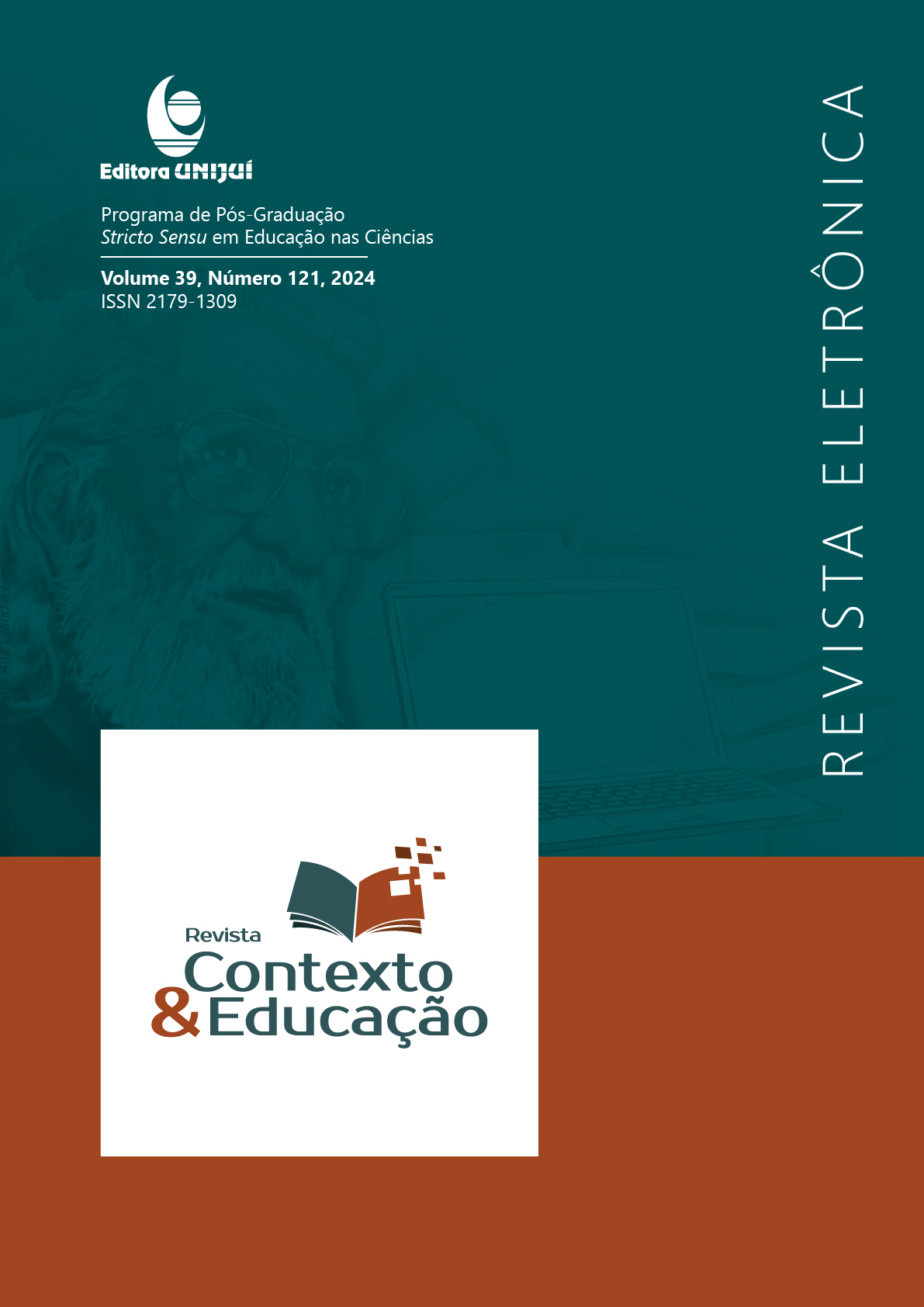The spanish language in the Brazil-Peru border region: Views on teaching and learning in pandemic times
DOI:
https://doi.org/10.21527/2179-1309.2024.121.13670Keywords:
Teaching and Learning, Border Region, WhatsApp, Spanish LanguageAbstract
This article presents the results of the work that aimed to investigate the teaching and learning processes of the spanish language, in the spanish language course, remotely developed using the WhatsApp platform as a teaching tool, together with the portuguese and spanish literature faculties of the nature and culture institute (NCI) of the federal university of Amazonas (FUAM). In that regard we proceeded methodologically using a 15 questions questionnaire, among them, 07 of them were close and 08 of them were open, all formulated by the Google Forms and applied for 42 students, in which 24 responded the questionnaire. Our analysis were based on the questionnaire and on Borges and Paiva (2011), Kunski (2012), Có et al. (2020), Araújo e Bottentuit Junior (2015) reflexions, as well as the content analysis (BARDIN, 2016) organized in 3 analysis procedures steps. 1) pre-analysis; 2) material exploration and 3). The first category is about the participants of the research; the second is related to internet and connectivity; the third is related to the use of WhatsApp as a teaching platform and the fourth, is related to the teaching and learning of the Spanish language in the remote modality. With that, we are going to be able to identify the difficulties faced by the students of the remote learning method.
References
ARAÚJO, P. C.; BOTTENTUIT JUNIOR, J. B. O aplicativo de comunicação WhatsApp como estratégia no ensino de Filosofia. Revista Temática, Paraíba, ano XI, n. 02, fevereiro. 2015. Disponível em: https://periodicos.ufpb.br/ojs/index.php/tematica/article/view/22939. Acesso em: 22 de out. 2021.
BARDIN, L. Análise de Conteúdo. São Paulo: Edições70, 2016.
BORGES, E. F. do V.; PAIVA, V. L. M. de O. e. Por uma Abordagem Complexa de Ensino de Línguas. Linguagem & Ensino, Pelotas, v.14, n.2, p. 337-356, jul./dez. 2011. Disponível em: https://periodicos.ufpel.edu.br/ojs2/index.php/rle/article/view/15396. Acesso em: 18 de out. 2021.
CANALE, M., SWAIN, M. Theoretical bases of communicative approaches to second language teaching and testing. Applied Linguistics, vol. 1, n. 1, p. 1-47, 1980. Disponível em: http://www.uefap.com/tefsp/bibliog/canale_swain.pdf. Acesso em: 19 de jan. 2022.
CERVO, A. L. BERVIAN, P. A. Metodologia Científica. 5. ed. São Paulo: Prentice Hall, 2002.
CÓ, Elisa Prado; AMORIM, Gabriel Brito; FINARDI, Kyria Rebeca. Ensino de línguas em tempos de pandemia: experiências com tecnologias em ambientes virtuais. Revista Ciência e Cibercultura, Rio de Janeiro, v. 4, n.3, p. 112, set/dez, 2020. Disponível: https://www.e-publicacoes.uerj.br/index.php/re-doc/article/view/53173. Acesso em: 19 de out. 2021.
GIL, A. C. Métodos e Técnicas de Pesquisa Social. 5. ed. São Paulo: Atlas, 1999.
KENSKI, V. M. Educação e Tecnologias: o Novo Ritmo da Informação. 8ª ed. Campinas, SP: Papirus, 2012.
LAKATOS, E. M.; MARCONI, M. A. Fundamentos Metodologia Científica. 4. ed. São Paulo: Atlas, 2001.
LIMA, I. P. de; FERRETE, A. A. S. S. WhatsApp em Práticas de Ensino e Aprendizagem em Tempo de Pandemia. Educon 2020, São Cristóvão-SE, v. 14, n. 8, p. 1-15, set. 2020. Disponível em: https://ri.ufs.br/bitstream/riufs/13730/15/14. Acesso em: 12 de out. 2021.
MENDES, E. Língua, Cultura e Formação de professores: por uma Abordagem de Ensino Intercultural. In: MENDES, E.; SOUZA CASTRO, M. L. Saberes em Português: Ensino e Formação docente. Campinas-SP: Pontes Editores, 2008.
TRIVIÑOS, A. N. S. Introdução à Pesquisa em Ciências Sociais: a Pesquisa Qualitativa em Educação. São Paulo: Atlas, 1987.
Downloads
Published
How to Cite
Issue
Section
License
Copyright (c) 2024 Revista Contexto & Educação

This work is licensed under a Creative Commons Attribution 4.0 International License.
By publishing in Revista Contexto & Educação, authors agree to the following terms:
All works are published under the Creative Commons Attribution 4.0 International License (CC BY 4.0), which allows:
Sharing — to copy and redistribute the material in any medium or format;
Adaptation — to remix, transform, and build upon the material for any purpose, even commercially.
These permissions are irrevocable, provided that the following terms are respected:
Attribution — authors must be properly credited, a link to the license must be provided, and any changes made must be indicated.
No additional restrictions — no legal or technological measures may be applied that legally restrict others from doing anything the license permits.
Notices:
The license does not apply to elements that are in the public domain or covered by legal exceptions.
The license does not grant all necessary rights for specific uses (e.g., image rights, privacy, or moral rights).
The journal is not responsible for the opinions expressed in the articles, which are the sole responsibility of the authors. The Editor, with the support of the Editorial Board, reserves the right to suggest or request modifications when necessary.
Only original scientific articles presenting research results of interest that have not been previously published or simultaneously submitted to another journal with the same purpose will be accepted.
Mentions of trademarks or specific products are intended solely for identification purposes and do not imply any promotional relationship by the authors or the journal.
License Agreement (for articles published from October 2025): Authors retain the copyright to their article and grant Revista Contexto & Educação the right of first publication.


